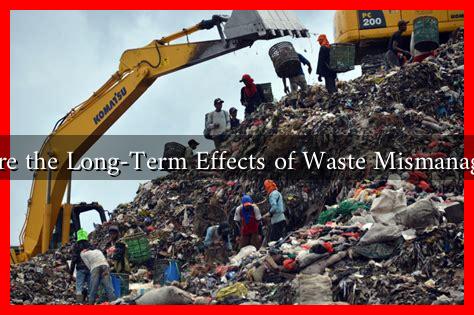-
Table of Contents
What Are the Long-Term Effects of Waste Mismanagement?
Waste mismanagement is a pressing global issue that affects not only the environment but also public health, economic stability, and social equity. As urbanization and industrialization continue to rise, the volume of waste generated has increased exponentially. Unfortunately, many regions lack the infrastructure and policies necessary to manage this waste effectively. This article explores the long-term effects of waste mismanagement, highlighting its implications for the environment, human health, and economic development.
The Environmental Impact of Waste Mismanagement
One of the most significant long-term effects of waste mismanagement is environmental degradation. Improper disposal of waste can lead to soil, water, and air pollution, which can have devastating consequences for ecosystems and biodiversity.
- Soil Contamination: Hazardous waste, such as heavy metals and chemicals, can leach into the soil, rendering it infertile and unsafe for agriculture. For instance, the Love Canal disaster in the 1970s in New York highlighted the dangers of toxic waste buried beneath residential areas, leading to severe health issues among residents.
- Water Pollution: Landfills can contaminate groundwater with toxic leachate, affecting drinking water supplies. According to the Environmental Protection Agency (EPA), approximately 20% of the nation’s groundwater is contaminated by landfill leachate.
- Air Quality: Open burning of waste releases harmful pollutants into the atmosphere, contributing to respiratory diseases and climate change. The World Health Organization (WHO) estimates that air pollution causes around 7 million premature deaths annually.
Public Health Consequences
The mismanagement of waste poses significant risks to public health. Poor waste disposal practices can lead to the proliferation of disease vectors, such as rats and mosquitoes, which thrive in unregulated waste environments.
- Increased Disease Incidence: Areas with inadequate waste management systems often experience outbreaks of diseases such as cholera, dengue fever, and malaria. For example, in 2010, a cholera outbreak in Haiti was linked to poor waste management practices following the earthquake.
- Long-Term Health Issues: Exposure to hazardous waste can lead to chronic health problems, including cancer, respiratory diseases, and neurological disorders. A study published in the journal Environmental Health Perspectives found that children living near landfills had a higher risk of developing leukemia.
Economic Implications
Waste mismanagement also has far-reaching economic consequences. The costs associated with cleaning up polluted sites, healthcare for affected populations, and lost productivity can be staggering.
- Cleanup Costs: Governments often bear the financial burden of cleaning up contaminated sites. The Superfund program in the United States, designed to clean up hazardous waste sites, has spent billions of dollars since its inception in 1980.
- Impact on Tourism: Areas plagued by waste mismanagement may deter tourists, leading to a decline in local economies. For instance, the beaches of Bali have faced significant challenges due to plastic waste, impacting tourism revenue.
- Job Losses: Poor waste management can lead to job losses in sectors such as agriculture and fishing, where pollution affects livelihoods. A report by the United Nations Environment Programme (UNEP) estimates that transitioning to a circular economy could create 1.8 million jobs in the waste management sector alone.
Social Equity Issues
Waste mismanagement disproportionately affects marginalized communities, exacerbating social inequalities. Low-income neighborhoods often bear the brunt of poor waste management practices, leading to health disparities and reduced quality of life.
- Environmental Justice: Communities of color and low-income populations are often located near landfills and industrial sites, exposing them to higher levels of pollution. The concept of environmental justice seeks to address these inequities and ensure that all communities have access to a clean environment.
- Community Displacement: In some cases, waste management facilities are built in vulnerable communities, leading to displacement and loss of homes. This can create social unrest and further marginalize affected populations.
Conclusion
The long-term effects of waste mismanagement are profound and multifaceted, impacting the environment, public health, economic stability, and social equity. As the global population continues to grow, addressing waste management challenges becomes increasingly urgent. Effective policies, community engagement, and sustainable practices are essential to mitigate these effects and promote a healthier, more equitable future. By prioritizing responsible waste management, we can protect our planet and ensure the well-being of future generations.
For more information on waste management practices and their implications, visit the EPA’s Sustainable Management of Materials page.

